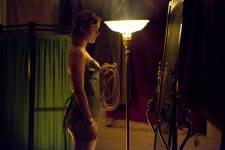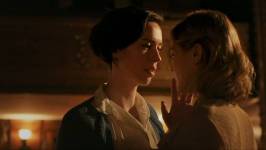THE FATHER: Let a man but speak these things out, and folks at once label him a cynic.
But it isn't true. He is like all the others, better indeed, because he isn't afraid to reveal with the light of the intelligence the red shame of human bestiality on which most men close their eyes so as not to see it.
-- Luigi Pirandello, Six Characters In Search of an Author (1921)
Society judges us.
You can claim a rebellious life outside the boundaries, above laws and rules and regulations, in willing, blissful ignorance of conventions and standards defined by specific invisible forces, faceless committees, and gossipy neighbors. But regardless of circumstances around which and by which we define our every day, material (the mental kind is a definite 'nother thread, which I may or may not touch upon later) existence, the very act of being, of us interacting with so-called fellow humans within a particular society (or societies--multiple, overlapping, exclusive and inclusive, underground and temporary) inevitably exposes us, thrusts us direct into the spotlight, illuminated by the eyes of those around, in the immediate vicinity of, and, in this digitally globalised Age, those unseen to and not even privy to our 'true selves' (sure, however you are comfortable in determining those to be) of, us.
You, Me, Us, (and Them):
Are we the them? We must be. Can't help it, sorry.
(Notice my selective, intentional usage of the word 'us': Yes, I am on your side. Yes, we are about the same when it comes to impressions and silent commentaries on those we know and those we don't and those we want to know, those we want to love, and those we hate to love and love to hate. (Grand, isn't it. The human psyche. If we do understand it all, psychology, sociology, neuroscience, or the wonderful, overarching sciences devoted to dissecting men's--and women's--hearts and minds should cease to exist. It's like the way Tyler Glenn belts out my favorite line on the Love In the 21st Century Track (a la Neon Trees' aptly named and wildly--criminally, to voice my singular opinion out there--underrated Pop Psychology (2014) album: Wish I could dissect your brain apart./ It takes a vivisection just to understand your heart. God, you know a lovesick me (that transient, painful state of existence which has now departed my soul and left me at peace for the time being) prayed and prayed that the lyrics were an exaggeration.
To 'understand' the heart of another person, especially the one you're vying for affections from--and let us return to that matter soon enough--a vivisection is a mere harmless scratch on the surface.
To venture, actually permitting yourself on a trip down the rabbit hole of investigating someone on that level -- is to expose yourself to vulnerability of the highest degree. Dangerous, yet tempting and seductive. Don't say you haven't thirsted to try, not even in the slightest. Marston can grab onto his lie detector and throw his DISC theory at me, but reason stands that man is far too complicated, too fickle, too tempestuous, and capricious for a snap judgment and yet at the heart and in Dostoyevsky's words, too simple and too delicate for a detailed analysis.
But I digress.
And yes, I do acknowledge my being judged and judging--because feedback is a two-way street, and writing this reflective piece, feeding into the storage space of some remote server somewhere, is in and of itself a meta-judgment piece. You yourself have been and got started on judging me from the first word. Don't bristle. I know so.)
My point, after that giant maze of brackets, is: none of us is spared. Humans make choices, decide on courses which establish paths, construct environments, and impact their character, growth, and well-being in their lives, yet we cannot hide from the consequences of our own making, of our own design (and, some would say, desires), upon which we have set up our lives.
Judgments surround us, pick at us, follow us--two steps back, one step ahead--like an omnipresent, ever lingering phantom shadow.
Breathe, exist. Be the way you are, as you are. Or even attempt to be who you want to be, fake your way to be who you (don't) want to be, and you are judged.
By your words, by your appearance. By your thoughts. Your actions. Your outputs to the world (be it artistic, scientific, athletic, what have you), or simply, as I opened this (whatever this is) with, your existence.
It's no joke. As Bar, Neta, and Linz (2006) proved 39 milliseconds adequate for an appearance-based personality judgment, irregardless of overall judgment time, we do jump to snap conclusions*.
To exist, to maintain your identity (inclusive of your intrinsic, personal idea of who you are, where you belong, who you love, and the multitude of pieces that shape you as you are) as you claim you wish to be, is a fragile thread to balance upon.
our dynamic duo.
"The world won't let us," Elizabeth Marston replied to her husband, regarding their situation, and I found myself bubbling with excitement--because, against all odds, they did--not beat the world, but--defy society in a daring, unified act.
"The world can't stop us," declared William, and the course was set.
That they termed 'the world' was their immediate vicinity, their campus, their students, their neighbors, their acquaintances--those tangible opposing forces and reliably disapproving sources. That they viewed 'the world' as 'the world,' was their interpretation of contemporary conventions during their time.
'The world' was a place. 'The world' was the circumstances in which they'd chosen (and in Elizabeth's case, struggled) to exist and survive within. 'The world' was defined, invisible, righteous (due to a consensus) boundaries lay aground by religion and society. 'The world' was known practices and arresting hands of those that came before, preceding professors and happy, smiling families (see also: the propaganda that was the downright offensive 50s
Housewife manuals).
(And 'the world,' in our time, is boundary-less and more open than the Marstons could ever imagine. The internet's existence lights simultaneous fires, positive or negative, feedback and conversations of unseen, virtual faces springing across timezones and countries within seconds. To exist in 'this world,' to throw yourself and your personal thoughts out there, can pose overwhelming reactions, attention, and interactions--wanted and unwanted.
Because 'the world,' as it stands, is no longer 'the world,' of the Marstons' term, but is, and there is nothing that can stop it, literally the world itself.)
But 'the world' was also what they would make of it, what they'd envision, understand, and interact so as to continue existing within, it to be.
For 'the world,' far from society, laws, religious codes, and disapproving neighbors, existed, quite rightly and as it should, in their minds and is of direct impact to no other place but four rooms of their beating hearts.
"Why not?" a question posed in the film by one of the three leads, is two simple words that together deconstruct conventions. Defy standards. Break the established moulds and painstakingly sketched, boxed outlines and boundaries in favor of innovations, of something ground-breaking. The tiny 'not,' dropped into the phrase a paradoxical tinge of those daring enough, those brave enough, those headstrong, obstinate, and confident enough, to live life by their own terms, in spite of society's judgments.
Look at this piece of art.
To co-exist alongside the torrents and turbulent streams of criticisms, jabs, commentaries, judgments, (most of the time on the subjects 'the world,'--- or 'they', as we vehemently often refer to them in our complaints, diaries, and helplessly anguished albeit therapeutic confessions to those in our lives who would listen---who we trust to listen--deem themselves privy to by the so-called, self-declared rights in their minds when it is, when it comes to family and personal matters, none of their business) is an act of defiance, of rebellion, or, to put simply: to live.
Do judgments or mere words carry weight? Only if we let it, ladies and gents. Only if we let it.
Marston stared on in melancholic disbelief as his beloved creation was burned before his eyes, as pages of Diana's adventures and his published theories disguised in digestible form to the general American public crumbled up in flames, and the woman head-spearing herself as an authority figure invaded in and imposed upon his creative space, inhibiting him from acting further upon his hobby and alternate choice (post-dismissal of an reputable academic career) of earning a living and feeding mouths, blocking him and barricading herself against a figure entirely of his own creation, borne out of love and based on the two greatest loves of his lives. It's true that we can feel invaded, inhibited by prying eyes, deeming themselves relevant to pieces of our lives we chose to expose to society and the greater world, those who take it upon themselves to tear apart, dissect, dissimilate, deconstruct, and destroy (at the risk of sounding like the hypocrite that I am--self-labelled) well-intentioned pieces of creative work for reasons convenient, logical, and (not at the risk of anything at all, as would be coming from their side, their point of view. I'm meriting their opinion. So it goes.) sensible to them.

her.
But must we stop living?
Must we stop doing, believing, instilling a sense of hope into what we love? Into (again, self-labelled) solid, conscientious work which we have but invested hours of this short life on earth laboring on, in feeble, self-perpetuated dreams that it would be noticed by at least a single person?
Love is pain, ladies and gents. Let me bring that up in the encore and say it louder for the people in the back.
(Thanks, Taylor Swift**.)
In the words of director Angela Robinson, "Their love for each other is not an issue in the movie," it's society that exists as their opposition. It's society in which the three of them, her 'tripod' of a polyamory, must instigate themselves in and integrate themselves back into. So, in taking those three words (from the lips of my beloved J.J. Feild, whom I could not be more pleased to glimpse in the film in such a pivotal role), I'm talking about the labor of love.
Of nurturing and developing, revising and improving, adding human touches and peppering early feminist psychological ideas, into a daring creation the 'world' was not ready for and was all too eager to misunderstand, misinterpret, and gang up upon.

caught in the act.
How was he---how were they (in the face of Wonder Woman, not their lives, which was, in the end, handled flawlessly)--to fight back against 'the world' which seemingly (and wrongly) despised their, and particularly his, creation so?
Because impacting other lives through your creation is a matter entirely separate and independent of guarding and handling your personal life against society.
But both, as is the recurring thesis of this (whatever this is), are subjected to society's interpretations. Here, again, let me borrow Pirandello's genius:
The Father. But don't you see that the whole trouble lies here. In words, words. Each one of us has within him a whole world of things, each man of us his own special world. And how can we ever come to an understanding if I put in the words I utter the sense and value of things as I see them; while you who listen to me must inevitably translate them according to the conception of things each one of you has within himself. We think we understand each other, but we never really do.
The above paragraph is one literary explanation of the word "subjective," even by reasoning judgments and opinions. We judge people, their art, their actions, their words, their decisions, their lives, through our own lens, our own background, education, experiences (objective, subjective, real, imagined, vicariously lived through others', I'm throwing in the whole lot)---they may not be, fully, 'they' as they are (or as they intend to be) in our eyes.
'They' (and their whatever else as listed) are our personal interpretation of themselves, nothing more.
Communication plays a key role, sure, but in abiding by the so-called societal laws and/or word-of-mouth of peers and friends sharing a common bond of some sort, it is the very same method through which our portrait of 'them' become standardized, become a common consensus among a select few through the grapevine, or a whole group of (can be read selectively, depending on the political climate and situation and your own political inclination. Not claiming any authority here on determining how this piece should be read and interpreted) brainwashed population---those kids cheering and dancing around the Wonder Woman comics' bonfires as we watched on in horrified surprise.
And so it is that 'their' interpretation of ourselves (and whatever else) transforms into 'an' interpretation. But, like all interpretations, opinions, and reviews, it is up to 'the herd' and its 'diverse, many-sided consciences'*** (Pirandello, good sir) to choose, while digesting, to believe, debate, or refuse.
Ugh. This glorious cover!
A fact I'd learned from life the hard way is that it's impossible to stop words from being spoken on you, around you, behind you--all the more impossible to stop thoughts from constructing those words in the first place, thoughts that, according to Pirandello, "have an illusion of being one person for all, of having a personality that unique in all that act," which lead to "an atrocious injustice to judge us by that action alone, as if all our existence were summed up in that one deed."
An action which cements the all-encompassing judgment of a person, that's how I used to remember it in high school.
"What is normal?" Marston asked his female cohort during the film's first scene. And the question hung in our minds throughout, left suspended by a rope's end in the air, as the polyamory formed, as the rope was introduced, as the Marstons and Olive slipped deeper into their blissful triad while exchanging the love they all had for each other. And the neighbor, upon stumbling onto a tied Marstons block and Nurse Olive, judged them as 'perverse' and 'unnatural', and potentially toxic enough to corrupt their children's young minds, by that one action, in spite of their other redeeming characteristics (which we, the audience, learned through Robinson's lens, vision, and framing--if you wanted to get meta about judging an already judged piece of art. Robinson answered in almost every interview that, determined to form her own interpretation of them as a Wonder Woman fan, she did not try contacting the Marstons prior to writing or shooting, only afterwards did she reach out to Christie Marston, who dismissed the film as a 'fictional portrayal' of the Marstons' family history-- so I'm going to treat this the same way as 2011's The Social Network: a marvelously sumptuous, rewatchable, enjoyable 'biopic' film and nothing else.)
"What is normal?" the question resurfaced as the film concluded, asking us to reflect not only on the story we had just witnessed but also on ourselves.
But the other question pressing on my mind is from Marston's lips:
"Who are you to judge us?"
It is one of defiance, of resilience, against a known authority figure, yes, but a question to the larger society as a whole, a question which about summed up this piece. There would always be self-appointed judges. There would always be remarks made by strangers who have no true idea about your life (or lives. Private, public, be that as it may.) There would always be reactions and responses, regardless of whatever it is you are associated with, whether it's an unconventional life of sadomasochism behind closed doors or voicing opinions into an online void.
(Oops.
To quote Rooney Mara's character in the iconic opening scene of The Social Network (2011): I am well aware that "The internet's written in ink," Mark.)
I see you, I'm aware of you. And I acknowledge your existence.
While ending this prolonged confession of a cinephile rant with the Reputation (2017) (Yes, I've converted into a full Swiftie over the past few days) prologue's beautifully succinct and gorgeous concluding sentences:
"There will be no further explanation.
There will be just
REPUTATION." ****
Postscript (to a PostScript)
*Bar, M., Neta, M., & Linz, H. (2006). Very First Impressions. Emotion, 6(2), 269-278. DOI:10.1037/1528-3542.6.2.269.
**"You’re not somebody else’s opinion of you....if you get rained on, you walk through a bunch of storms, life is constantly coming at you – that doesn’t make you damaged. It makes you clean. " -- Taylor Swift,
Compilation of "Clean" (1989) speeches
***from THE FATHER: For the drama lies all in this -- in the conscience that I have, that each one of us has. We believe this conscience to be a single thing, but it is many-sided. There is one for this person, and another for that. Diverse consciences. So we have this illusion of being one person for all, of having a personality that is unique in all our acts. But it isn't true. We perceive this when, tragically perhaps, in something we do, we are as it were, suspended, caught up in the air on a kind of hook. Then we perceive that all of us was not in that act, and that it would be an atrocious injustice to judge us by that action alone, as if all our existence were summed up in that one deed.
****Truly what's left of the Marstons through this film (withholding other sources!), innit?
Actual Film Commentary
I love this film, the way I haven't loved a film in 2017 before. (Dunkirk (2017) is in a category by itself because of merits.) Not an overarching statement when I confess that everything, from the lighting, the cinematography, to the script, warmed my heart. That kiss between Olive and Elizabeth in the middle of the rehearsal space was a delicious release of sorts. Phew.

yes.
The "Feeling Good" scene in the middle had me smiling and filled to the brim with joy, in watching them, in reveling in their carefree happiness, in such a luscious, divine fashion, bathed in orangey glows, in stage lights on an actual stage---a sly meta commentary on the Marstons + Olive placing their lives on display. Just as the upbeat "Sing, Sing with a Swing" number in the middle had me riveted by the montage of actions.
The entire film was a ball of sunlight I had the pleasure to bask in for one glorious afternoon. Rebecca Hall (my favorite lithe British brunette) had never been more beautiful, more attractive in my eyes, and Bella Heathcote's Olive threaded the arc from the naive, fresh-faced college girl to a headstrong woman so flawlessly. Luke Evans had me in his grip since that first sentence uttered, and the act of writing on the chalkboard regarding a psychology theory had never been sexier (say what?).
Parting Words
Of course, this has been a reflective piece, of how I related to the film. My--ahem--subjective opinion, fully accepting of how someone may say, I'm making this all about myself--but isn't that what (subjective) film-watching is about? You cry, you blush, you gawk, and you ponder, long after the credits roll, because you relate so much to a film in some way, because it triggers some bone in your body, because it calls to some nostalgia of your past, an all-too-familiar occurrence in the present, or an as-yet-anticipated future.

They're as cute off-screen as on.
At least, it's the way my relationship with films is, I'm saying that outright.
A relationship which no one can rob me of, no matter what.
Pirandello (For the last time! I'm hearing you. #NotSorry) drives us home by voicing my reasoning for engaging in this 'flow' of writing this entire piece through THE FATHER:
For man never reasons so much and becomes so introspective as when he suffers; since he is anxious to get at the cause of his sufferings, to learn who has produced them, and whether it is just or unjust that he should have to bear them.
To quote THE FATHER further,
Because I suffer, sir! I'm not philosophising: I'm crying aloud the reason of my sufferings.
A. S.
11. 22. 2017
//
Please, do feel free to react via one of the buttons below, or leave me a comment as feedback for future, ahem, pieces. I mean it. And I would love you for it.
x
-- KP









เข้าสู่ระบบเพื่อแสดงความคิดเห็น
Log in